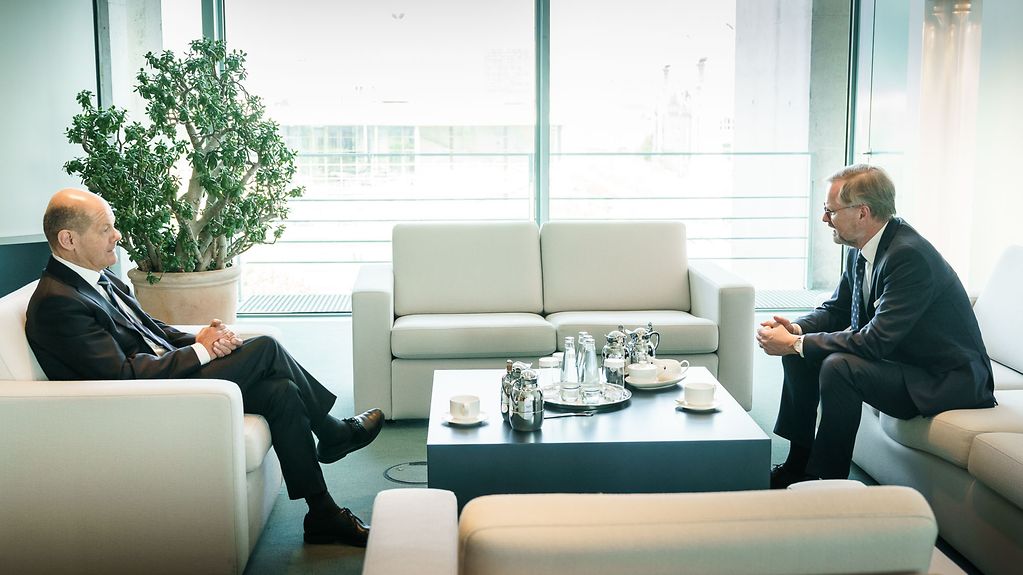Prime Minister of the Czech Republic visits Berlin
Close coordination through the EU and NATO partners in response to Russia's war of aggression against Ukraine were at the top of the agenda for talks between Federal Chancellor Scholz and Prime Minister Fiala of the Czech Republic. The Czech Republic will take over the presidency of the European Council in the second half of this year. The talks also addressed economic issues, particularly around the energy transition to reduce dependency.

Federal Chancellor Olaf Scholz in conversation with Prime Minister Petr Fiala of the Czech Republic.
Photo: Federal Government/Denzel
In the face of the terrible consequences of Russia's war of aggression in Ukraine, Federal Chancellor Olaf Scholz reiterated the Federal Government’s support. On the visit of his Czech counterpart Petr Fiala to Berlin on Thursday, the Federal Chancellor said that Germany and the Czech Republic agreed “that we must now continue to do all we can to support Ukraine.”
“We also agree that supporting its right to self-defence includes supplying arms so Ukraine can defend itself against the Russian invasion,” Scholz said, adding that both countries also stood ready to impose further measures around sanctions.
Energy transition to reduce dependency
Scholz also spoke of how every effort is being made to reduce current dependency on Russian energy supplies as fast as possible. “We have put measures in place to achieve this in a staged way. Nevertheless, it is clear that energy supplies from Russia do still play a major role for some, if not all, countries. For this reason we will work together to change this as soon as possible. We will also cooperate with each other and the Czech Republic as well to put the necessary emergency provisions in place,” Scholz stressed.
On this point the Federal Chancellor made it clear that “there is much we must do in this situation if we are to achieve the necessary changes to energy policy around the world.” He stressed that the energy transition should also be used as a means of reinforcing energy supply security within the European Union. “By doing this, we give a boost to the environment and to economic independence together,” Scholz said.
Czech Republic takes over the European Council Presidency in July 2022
Germany and the Czech Republic are not just neighbours, friends and economic partners: they are also close partners within the EU. The Federal Chancellor wished his Czech counterpart all success with the Czech presidency of the European Council, which is to begin in a few months, and assured him of Germany’s support.
With regard to the large numbers of refugees from Ukraine, Scholz explained their intention to continue working together “to deliver better distribution in this crisis and also undertake a long-term reform of the common asylum system.”
Reinforcing defence capabilities
Scholz also pointed out the joint work currently underway to further boost defence capabilities at national levels and also within NATO and the EU. In the Strategic Compass the EU had already set the course for a new alignment, Scholz said. “Now we want to work with the Commission to assess how we can increase efficiency in defence investments as well.”
Scholz also stressed the importance of the NATO summit to be held in Madrid in June as a major milestone. “Adopting the Strategic Concept will make NATO fit for the future,” Scholz said.
Petr Fiala has been Prime Minister of the Czech Republic since 28 November 2021. The Czech Republic became a member of NATO in March 1999 and joined the European Union on 01 May 2004.